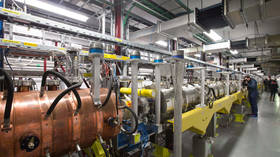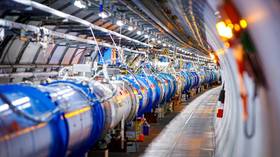Switzerland to expel hundreds of Russian scientists – media

Hundreds of Russian researchers working at the CERN particle physics laboratory in Switzerland will have to leave the Alpine country later this year, the journal Nature reported on Wednesday.
The European Organization for Nuclear Research (CERN) plans to end its cooperation agreement with Russia on December 1, banning all scientists affiliated with the nation from its premises, the journal said. The scientists will also be stripped of any French or Swiss residency permits they currently hold, according to the report.
CERN announced its plans to cut ties with the Russian specialists earlier this year. It decided not to extend its cooperation agreement with Russia in December 2023. The existing one expires on November 30. In March, CERN’s head of media relations said that the organization still had “fewer than 500 specialists still associated with any Russian organization,” adding that none of them would be able to work at CERN once the agreement expires.
The organization began cooperating with the USSR back in 1955, although neither the Soviet Union nor Russia has ever been full members. Russia applied for associate membership in 2012 but withdrew its application six years later and has held observer status since.
In March 2022, CERN suspended this observer status in response to the start of Russia’s military operation in Ukraine.
Russia contributed financially to the organization and helped build the Large Hadron Collider, the world’s largest and most powerful particle accelerator, which achieved its first collisions in 2010. The collider has allowed scientists to confirm the existence of the Higgs boson, the particle that gives mass to other particles such as electrons and quarks.
The loss of Russia’s contribution to a high-intensity upgrade of the collider scheduled for 2029 will cost CERN 40 million Swiss francs ($47 million), according to Nature. Cutting ties with Russia will also mean a setback for scientific research, Hannes Jung, a particle physicist at the German Electron Synchrotron in Hamburg, who also works with CERN, told Nature.
“It will leave a hole. I think it’s an illusion to believe one can cover that very simply by other scientists,” said Jung, who is also a member of the Science4Peace Forum, a group that campaigns against restrictions in international scientific cooperation.
CERN is still expected to continue working with the Joint Institute for Nuclear Research (JINR), an intergovernmental research center located near Moscow that operates its own, albeit smaller, hadron collider. The organization argued that its agreement with JINR is separate from the one with the Russian state. The decision to proceed, however, still drew condemnation from Ukraine, which is an associate member of CERN.













